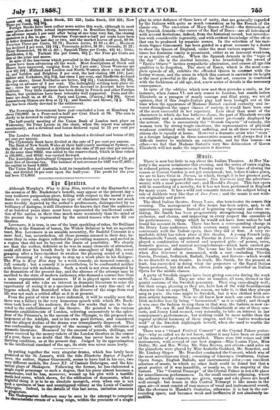RI tuft.
There is now but little to say about the Italian Theatres. At Her Ma- jesty's the season terminates this evening, and the series of extra nights, at reduced prices, commences on Tuesday next. The time of closing the season at Covent Garden is not yet announced ; but, before it takes place, we are to have Grisi in Norma, in which, though it is her greatest part, she has not once appeared this season ; Don Giovanni (say the advertise- ments) with a most powerful cast ; and Herold's Tampa. This last opera will be something of a novelty, for it has not been performed in England for many years. It has a wild and romantic interest, the subject being a tale of diablerie very like that of Don Juan ; and the music is not with- out originality and power.
The third Italian theatre, Drury Lane, also terminates its season this evening. The management of this house has been active, and, to all appearance, prosperous. Instead of beginning vigorously and then re- laxing, Mr. Smith has been progressively strengthening his company, orchestra, and chorus, and improving in every respect the ensemble of his performances ; things which he would not have done unless he had found his account in them. There has been a corresponding change in the Drury Lane audiences, which contain many more musical people, conversant with the Italian opera, than they did at first. A very re- markable (laid has taken place at this theatre. A young French lady, Mademoiselle Vaneri, appeared on Tuesday in Luerezia Bogie, and dis- played a combination of natural and acquired gifts—of person, voice, dramatic genius, and musical accomplishment—which have excited ge- neral surprise and admiration. The lessee has his benefit this evening, when Don Giovanni is announced, with a cast—including Viardot Garcia, Persiani, Sedlatzek, Badiali, Naudin, and Revere—which would do no discredit to any theatre. In truth, Mr. Smith, for the present at least, has succeeded in doing what the projectors of the Royal Italian Opera professed, but did not do, eleven years ago—provided an Italian Opera for the middle classes.
A party of Swedish singers have been giving concerts during the week at St. James's Hall. They are nine in number, all men, dressed in the quaint costume of the Swedish peasantry. They sing exceedingly well but their songs, pleasing as they are, have less of the wild Scandinavian character than we expected. The reason, we take it, is that they always sang in parts : the tune might be Swedish, but it was clothed with mo- dern artistic harmony. Now we all know how much our own Scotch or Irish melodies lose by being " harmonized," as it is called; and though it was once the fashion to sing them in that way, the fashion is now ex- ploded. We saw M. and Madame Otto Goldschmidt at one of these con- certs, and Jenny Lind seemed, very naturally, to take an interest in her countrymen's performances, but nothing could be more unlike than the regular artificial harmony of these singers, and the " native woodnotea wild" of the Swedish nightingale herself, when she used to warble the songs of her country.
There was a "Grand Festival Concert" at the Crystal Palace yester- day—why so called we do not know, unless it may have been on account of the number of performers assembled. There were SOO voices and 200 instruments, with several of our best singers—Miss Louisa Pyne, Miss Dolby, Mr. and Mrs. Weiss, Mr. Sims Reeves, and others—and solos on the pianoforte were played by Miss Arabella Goddard, Mr. Benedict, and Mr. Lindsay Sloper. Mr. Benedict conducted the Concert, which was of the most miscellaneous kind ; consisting of Choruses, Overtures, Italian Opera Songs, English Ballads, and instrumental solos ;—an excellent selection of music, to which no other fault could be found but that a great portion of it was inaudible, or nearly so, to the majoiety of the visitors. The " Central Transept " of the Crystal Palace is not a fit place for miscellaneous performances. In the small enceinte adjoining, where the ordinary weekly concerts are given, songs and solo pieces are heard well enough : but music in this Central Transept is like music in the open air—it must consist of vast masses of vocal and instrumental sound, lace the choruses in Handers Oratorios, otherwise it is lost in the sur- rounding space, and becomes weak and ineffective if not absolutely in- audible.


























 Previous page
Previous page